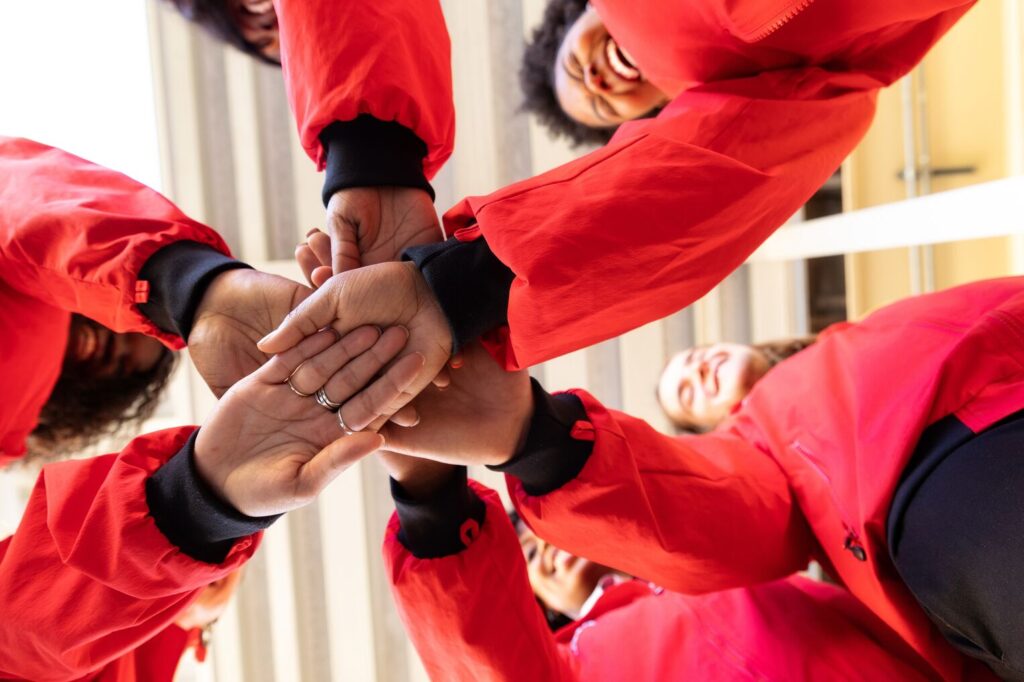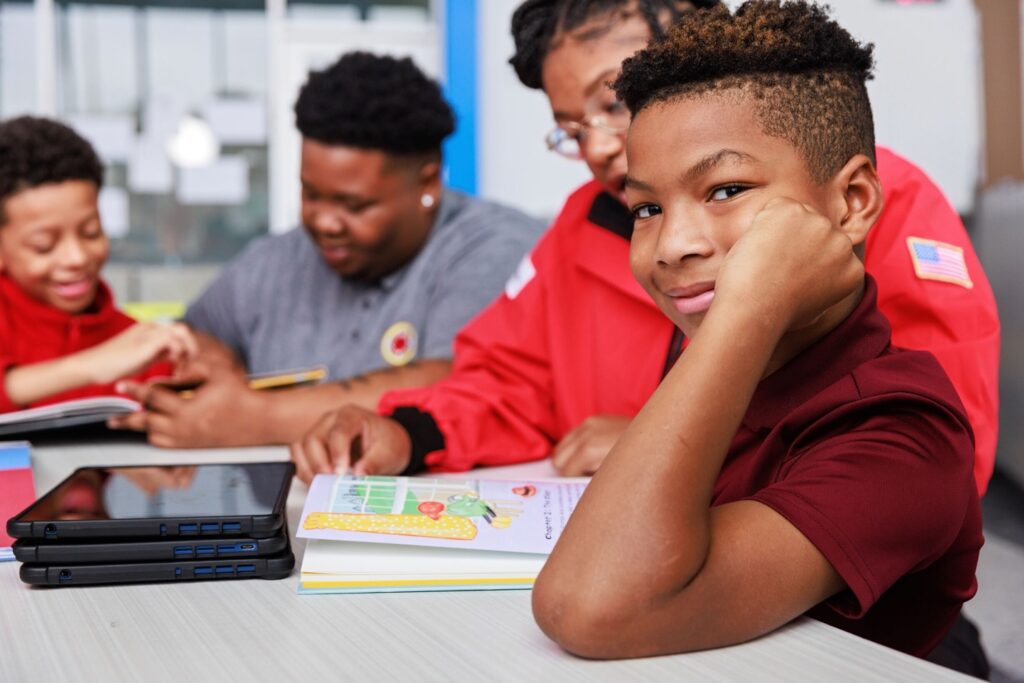National service builds critical workforce, civic and life skills
A new research project, the City Year Alumni Bridging Study, explores how the national service program AmeriCorps prepares young people with critical workforce, civic and interpersonal skills that can help them thrive professionally and shape their futures as community members and engaged citizens.

City Year AmeriCorps members are student success coaches.
These same skills, particularly those related to collaboration and the ability to work across lines of difference, are assets that can help bridge divides during increasingly polarizing times. We believe these key social-emotional skills may be of heightened value today in our workplaces, neighborhoods and civic life.
A collaborative research project
Conducted by researchers in the Bronfenbrenner Center for Translational Research (BCTR) and Einhorn Center at Cornell University and City Year’s Education Research & Strategy Team, the 2024 City Year Alumni Bridging Study used both qualitative and quantitative research methods to explore questions related to how national service prepares young people to bridge divides; pursue active engagement in community life; and build relationships with people from diverse backgrounds.
This collaborative research project was informed by feedback from City Year AmeriCorps members, alumni and staff. We sought to center specific questions about City Year’s long-term impact and value proposition that we believe young adults considering serving with us, alumni, corporate sponsors, and employers would be most interested in.
The partnership between Cornell University and City Year was incubated and supported by Einhorn Collaborative, a nonprofit foundation working to foster social connection and cohesion in the U.S.
Drawing from survey responses and interviews of over 2,000 City Year AmeriCorps alumni who served between 2012-2022, the City Year Alumni Bridging Study highlights three major themes:
- Serving as a City Year AmeriCorps member enhances a young person’s commitment to service long term.
- The AmeriCorps experience builds alumni capacity to “work across lines of difference,” meaning how they navigate working effectively and collaboratively with diverse teams in the workplace.
- A service year expands key interpersonal and social-emotional skills that are most in demand by employers—and arguably most needed in American civic life today.
This project also revealed areas of vulnerability the organization is committed to working on, such as AmeriCorps members’ cost-of-living concerns, the challenge of balancing service with mental health, and ensuring that diverse teams of people working together feel a sense of belonging and inclusion during their service experience.
We acknowledge these pain points exist and plan to use this feedback to improve our programs and support for AmeriCorps members and further explore how to address and mitigate these issues.
Cultivating top workforce skills
According to the 2023 Future of Jobs report by the World Economic Forum, “analytical thinking and creative thinking remain the most important skills for workers.” City Year’s school-based program and ongoing training for AmeriCorps members emphasize and reinforce eight of the 10 top professional skills outlined in the report.
Other top skills include resilience, motivation, self-awareness, curiosity, attention to detail, empathy and leadership, among others. These are the same durable skills that City Year AmeriCorps members support and nurture in the students they serve as student success coaches, and that they themselves sharpen and refine during their year of service in schools.
“All the basic group skills that I felt that were lacking on my professional side I developed in City Year.” – City Year alum
“What we saw in the results was alums saying that serving with City Year has helped them build bridges with people from different backgrounds, perspectives, workplace norms, and communication styles,” said Jessica Proett, City Year’s senior director of external evaluation.
Learn more about City Year’s holistic approach to student and school success.
“City Year alumni understand and prioritize the value of diversity in the workplace and feel able to form and be part of successful, collaborative teams,” she said. “We see these skills as critical assets, not only for employers and the economy, but for our communities and broader society.”
The ability to build relationships and “bridge” differences is valuable
The study also revealed that City Year alums developed key skills in problem solving and positive relationship building, continue to seek active engagement in their communities, and report a sense of workplace satisfaction, due to competencies they strengthened during a year of service, Proett added.
“We posit that the skill development of City Year AmeriCorps members may be uniquely valuable not only to help shape the professional and civic futures of our alums, but also help them build positive relationships at a time when trust and cooperation are eroding in our institutions and public sphere,” Proett said.
“City Year’s work is relationship-centric, and this is an area we hope to explore further in upcoming research projects.”
Service offers opportunities for personal growth and development
Serving with City Year offers opportunities for self-discovery and deeper clarity on their career journey that may be just as valuable to AmeriCorps members and alumni as professional skills, says Sean McDevitt, City Year’s senior career development director and a 2002 alum of City Year Boston.

Check out a four-page overview of the Bridging Study.
“We know there’s a significant overlap between the skills we focus on with our AmeriCorps members and the skills that are most in demand by employers today,” McDevitt said.
“But a year of national service also encourages the pursuit of individual identity development through reflection and meaning making spaces. Before knowing what industry to explore and where you want to apply your skills, it’s helpful to start with your values, what you care about, and your motivation to serve,” McDevitt said.
City Year “certainly helped affirm my values as a human and helped me want to advocate more because I understand the implications of not helping.” —City Year alum
City Year alumni: a lifetime of impact
Now a community of 40,000, City Year alums not only continue to lead and serve where they live and work—they provide vital feedback that has helped the organization evolve and improve.
Over the years, alumni feedback has helped City Year identify areas for improvement. One area of City Year’s work that is consistently named by alums as benefitting from additional resources and support, for example, is doing even more to help corps and alumni transition from their year of service to education and career pathways.
Learn more about the impact of City Year alumni.
“In this study, our alumni reported they had learned more about and had increased proximity to inequity in the education system because of their experience serving in schools,” said Laura Kazanovicz, City Year senior director of alumni impact and a 2004 alum of City Year San José/Silicon Valley.
Did you know nearly 50% of City Year alums currently work in the education sector? Learn more about our teacher pathway work.
City Year AmeriCorps alums also reported wanting to remain engaged in their community, another way that alumni continue to lead and serve well beyond their service year.
“There are many other ways to be engaged in the work of justice and creating space for equity, and I think that probably the biggest thing that I learned is that there are so many different avenues to engaging in community engagement and civic engagement.” –City Year alum
“This study is a powerful reminder that national service offers benefits to the individual and society on multiple levels,” Kazanovicz said.
“Through our work, and research, we can see AmeriCorps not only benefits the students and community in which an AmeriCorps member serves, but also benefits the service member in ways that support long-term career, interpersonal, and life skills.”
Learn more about City Year’s research and evidence of impact.
Related stories
Read more and check the City Year blog to learn the soft skills our corps members gain through a year...
Read more about Top five skills employers want you to have todayIf you speak with an alum of an historically Black college or university (HBCU) about their experience, you’ll quickly learn...
Read more about Serving with City Year sharpens job skills, HBCU graduate saysThe City Year Alumni Leadership Awards, presented by Truist, are City Year’s highest alumni recognition. The awards recognize outstanding alums...
Read more about City Year Honors Sacramento’s Macey Amissah-McKinneyThe effects of the COVID-19 pandemic linger for K12 education. Schools across the country continue to grapple with post-pandemic pain...
Read more about Improving student attendance through student success coaching















